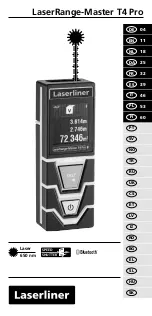
Command Syntax
6-7
SRS Residual Gas Analyzer
Command Syntax
The RGA commands are ASCII character strings consisting of a two letter (case
insensitive)
command name
, a
parameter
, and a
carriage return
terminator
.
Note:
The carriage return character, decimal ASCII value=13, is represented throughout
this manual with the symbol
<CR>
. All command strings must be terminated with this
character in order to be acknowledged by the RGA.
Valid
parameters
are:
Numbers
: Numbers are the most common type of parameter used to program the RGA.
Number parameters must be within a command-specific range and must not conflict with
any pre-existing parameter values of the head. Only Decimal format is accepted. The
fractional parts are truncated to four decimal places before being stored in memory. The
'+' sign is optional for positive numbers. A zero in front of the period is optional in
fractional numbers with magnitude less than one.
Asterisk “
” (default)
: A single asterisk indicates that the default parameter value
(stored in the RGA head’s permanent memory) is to be used for command execution.
The asterisk must be strictly followed by a <CR>.
Question mark “?”
(
Query
): Query commands are used to read error bytes, to measure
total pressure and to confirm internal parameter values. The question mark must be
strictly followed by a <CR> terminator. With a few exceptions, the data returned by
most query commands is a string of ASCII characters terminated by a linefeed (<LF>,
decimal ASCII value=10) and a <CR> terminator: string<LF><CR>
.
No parameter
: Some commands do not require a parameter.
The RGA assumes a
potential
command-string has been received over RS232 when a
<CR> character is detected in the serial interface. A
command handler
immediately
analyzes the string, and if everything checks, the command is executed. However, if a
problem is encountered a
communication error
is reported and no command execution
takes place.
The RGA has a 140 character input buffer and processes commands in the order received.
If the buffer fills up, the RGA will hold off handshaking on the RS232 interface using the
CTS line. Similarly, the RGA has a 32,000 character output buffer to store outputs until
the host computer is ready to receive. If either buffer overflows, the buffer is cleared and
the error is reported. Linefeed characters (<LF>, decimal ASCII value=10) and single
carriage returns (<CR>, decimal ASCII value=13)) are ignored by the serial interface.
Examples of command formats
The following list of commands activates the ionizer and triggers a single analog scan
from 1 to 100 amu at the default scan rate setting. Note that each one of the command
character strings must be strictly followed by a <CR> character in order to be detected
by the RGA’s command handler.
Summary of Contents for RGA100
Page 4: ...SRS Residual Gas Analyzer iv...
Page 18: ...xviii Command List SRS Residual Gas Analyzer...
Page 46: ...2 14 Residual Gas Analysis Basics SRS Residual Gas Analyzer...
Page 66: ......
Page 78: ...4 12 Mass Filter Power supply SRS Residual Gas Analyzer...
Page 104: ......
Page 107: ...Programming the RGA Head 6 3 SRS Residual Gas Analyzer Error Byte Definitions 6 69...
Page 216: ...8 26 Quadrupole filter cleaning SRS Residual Gas Analyzer...
Page 246: ...11 2 SRS Residual Gas Analyzer...
Page 247: ......
Page 248: ......
Page 268: ...Appendix B SRS Residual Gas Analyzer 7...
Page 312: ...Appendix D SRS Residual Gas Analyzer 27...
















































